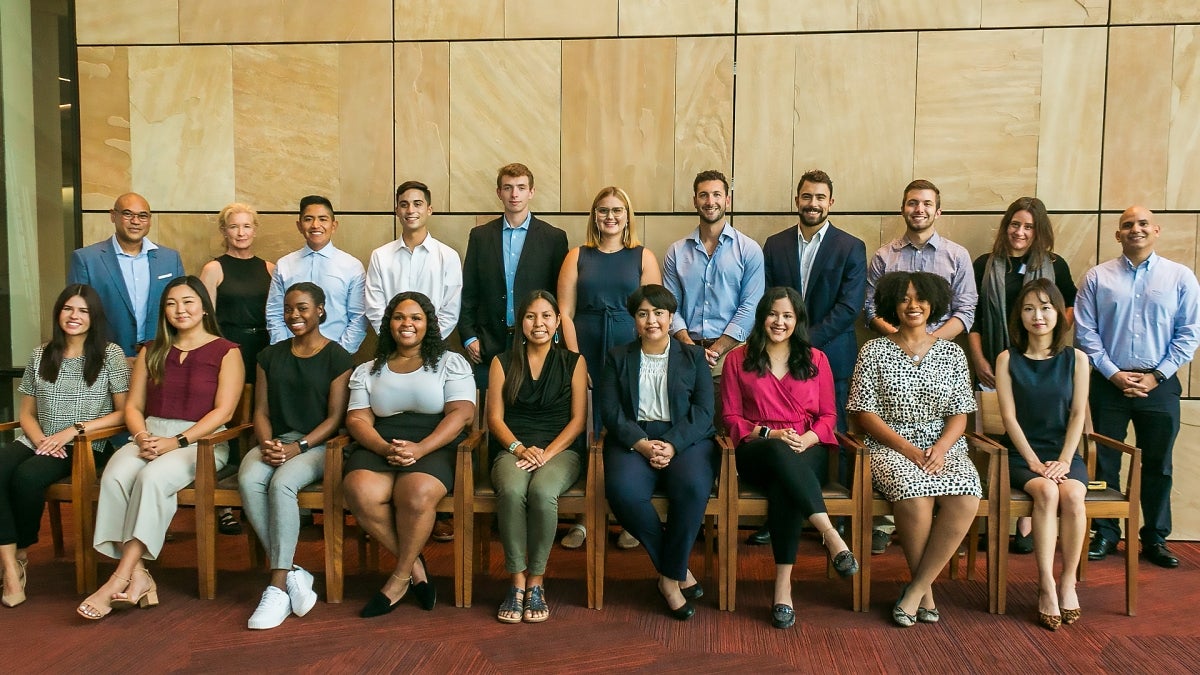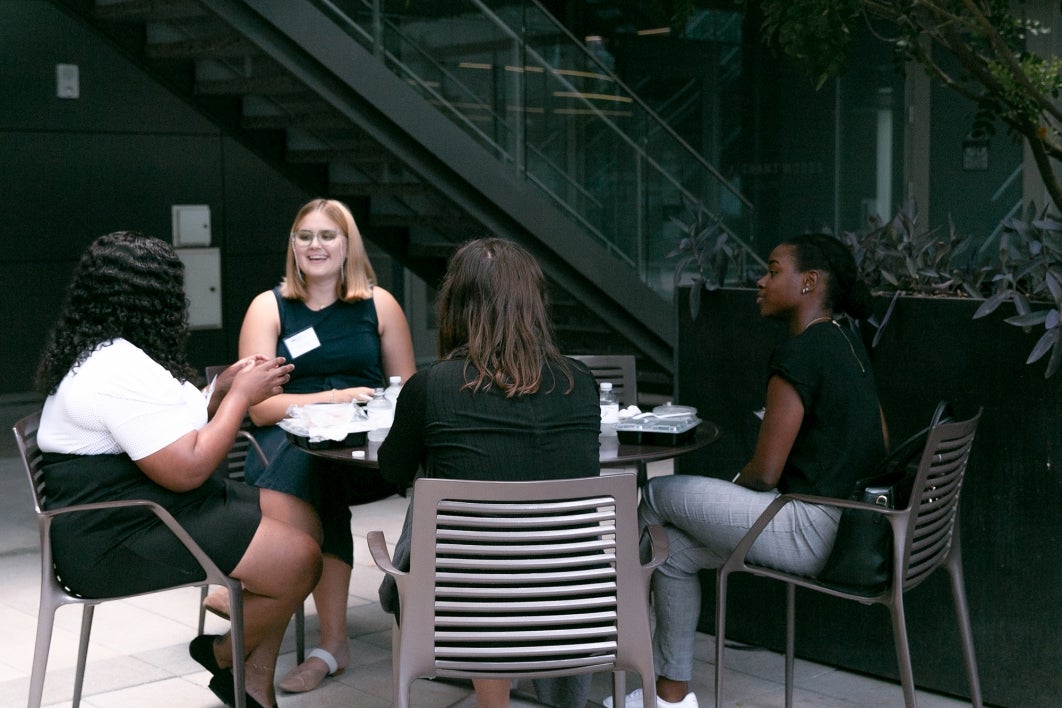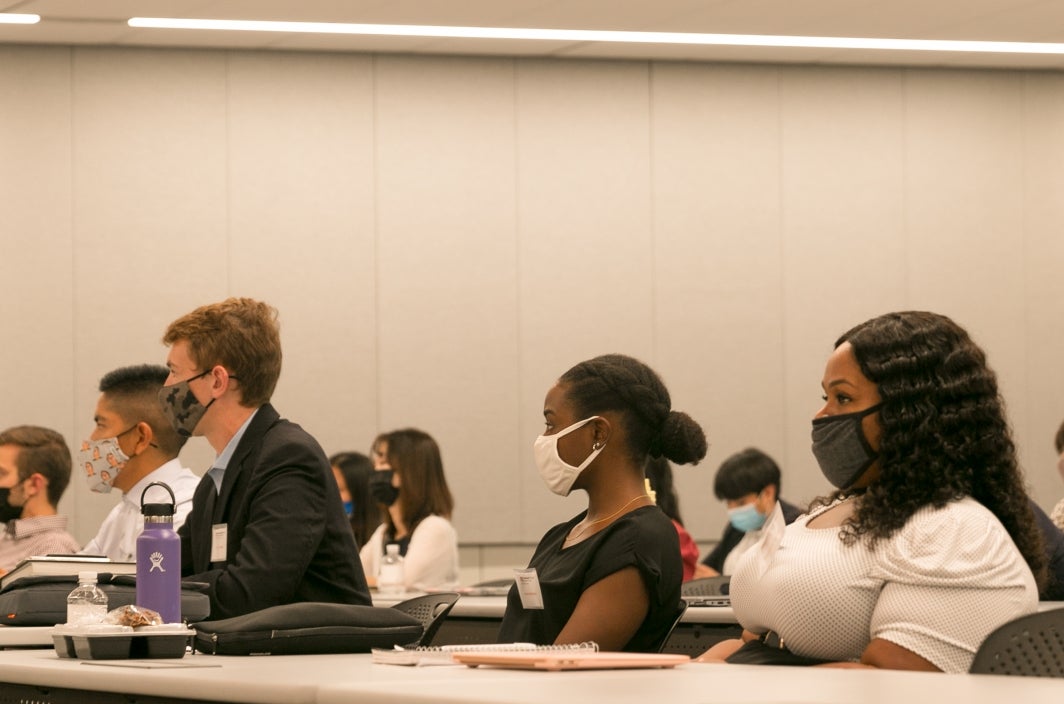ASU Law welcomes inaugural cohort of Advance Program students

Students in the first cohort of ASU Law’s Advance Program are (back row from left) Brian Ridley, Kathryn Walker, Grant Navakuku, Andres Machado, Kaleb Lester, Erin Ferber, Alex Egber, Aidan Wright, Andrew Ford, Carrie Hoffelt and Mike Veguilla. Front row from left: Taylor Vasicek, Esther Suh, Joanna Rivers, Courtney Moore, Natalia Sells, Angie Vertti, Bego Contreras, Nyelah Mitchell and Hyunji Park.
The new Advance Program at the Sandra Day O’Connor College of Law at Arizona State University welcomes its first cohort this fall including 20 students representing diverse backgrounds with nearly half of the group the first in their families to attend college.
The yearlong program aims to foster an inclusive community, bringing together students who have overcome adversity and who can offer diverse perspectives from racial, ethnic, cultural, religious, gender, sexual orientation, gender identity and expression, disability, socioeconomic and geographic diversity.
The students who comprise the inaugural group – eight men, 11 women and one nonbinary person – range in ages from 21 to 61. They identify as Black/African American, Hispanic/Latino, Native American, Asian and white/Caucasian. Four are military veterans.
“ASU Law is driven by our commitment to providing our students the best possible legal education, in an environment that is inclusive and cultivates a true sense of belonging. The Advance Program is the embodiment of that mission,” said Zachary Kramer, ASU Law co-interim dean.
Alyssa Dragnich, ASU Law clinical professor of law and faculty director of the Advance Program, kicked off the three-day workshop on Aug. 11. The students attended sessions taught by ASU Law faculty on topics such as reading and briefing cases; understanding issue, rule, application and conclusion; and preparing for class and the Socratic method. They also “climbed” Mount Everest in a simulation designed to encourage teamwork and heard from a panel of current law students.
“This is a phenomenal group of students. Their level of engagement, right from the start, is amazing,” Dragnich said. “We are going to see great things from them over the next three years.”
Paired with an attorney and 2L/3L student mentors, the Advance Program participants will continue to meet monthly throughout their first year of law school for a mix of academic and nonacademic programming.
From left: Courtney Moore, Erin Ferber, Carrie Hoffelt and Joanna Rivers break for lunch during the first day of the Advance Program workshop.
Some of the upcoming events include a session on preparing law school outlines; an interview skills session taught by Sharon Ng, an ASU Law alumna; lunch with local judges; and an end-of-the-semester Arizona Coyotes game organized by ASU Law alumna Marina Carpenter, general counsel, chief compliance officer and executive vice president of public affairs for the Coyotes.
“As someone who has known that a legal career was the path I was going to take for most my life, I often found it difficult to find and speak with people who have gone through the law school process,” said Andrés Machado, among the first program participants. “The Advance Program workshop helped give me a sense of what to expect in the coming three years of my life and prepare me for the various obstacles that I will have to face as a law student. I could not be more thankful for the program.”
“If the students with whom I shared this experience and the professors who generously shared their knowledge are representative of the others I will walk the path of ASU Law, I know I am about to enjoy the wonder of compassionate relationships and superior academic education," said Kathryn Walker, another participant who will also be part of the Indian Legal Program. "The Advance Program is a gift for which I am truly grateful.”
Brian Ridley, among the first Advance Program students, shared his story earlier with ASU News. An Army veteran who comes from Black and Japanese heritage, Ridley said he chose ASU Law because it incorporated things he had come to depend on: being part of a diverse team that felt like family, embeddedness in the community and mentorship.
“I was looking for a team,” said Ridley, who served nearly three decades in the Army and retired as a lieutenant colonel. “I needed a diverse place. I wanted to ensure that that team was ingrained in the community. I needed a microcosm of every military post that I've ever lived on, and that was ASU. And then to boot, it was well-respected. I mean, it was an easy, easy call.”
ASU Law professors, including Kaipo Matsumura, joined ASU Law students in teaching sessions during the August workshop.
“I was so impressed with these students’ active engagement, curiosity, and ability to bring different perspectives to our discussion about legal reasoning,” Matsumura said. “They participated confidently and engaged in deep discussions with each other. I also loved seeing them hanging out together after the day's sessions ended.”
For more information about the Advance Program or to make a contribution, contact Kelli.Rael@asu.edu.
Students in ASU Law’s Advance Program listen to Professor Amy Langenfeld as she teaches about reading and briefing legal opinions.
More Law, journalism and politics

Native Vote works to ensure the right to vote for Arizona's Native Americans
The Navajo Nation is in a remote area of northeastern Arizona, far away from the hustle of urban life. The 27,400-acre…

New report documents Latinos’ critical roles in AI
According to a new report that traces the important role Latinos are playing in the growth of artificial intelligence technology…

ASU's Carnegie-Knight News21 project examines the state of American democracy
In the latest project of Carnegie-Knight News21, a national reporting initiative and fellowship headquartered at Arizona State…

